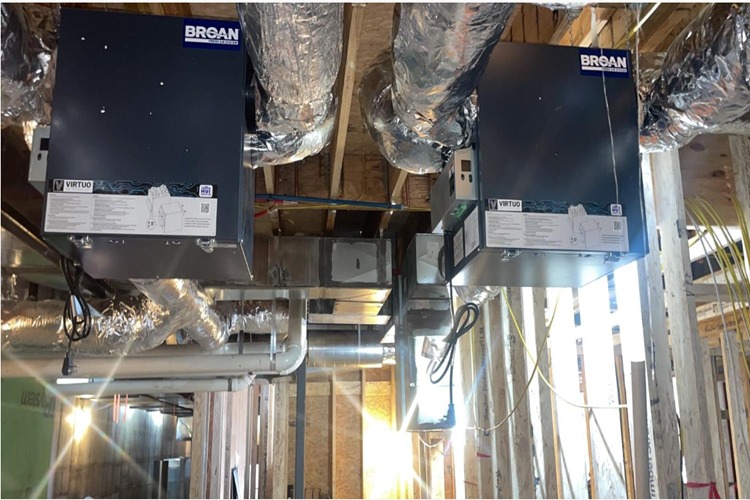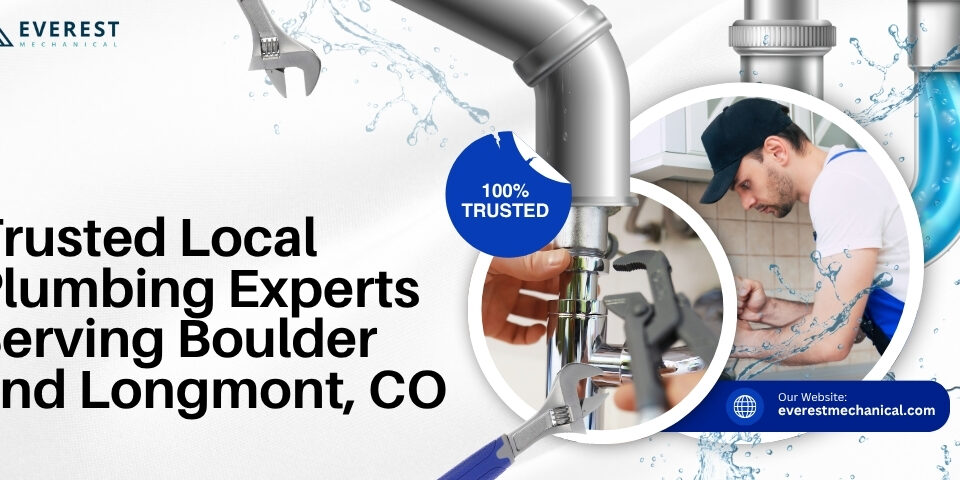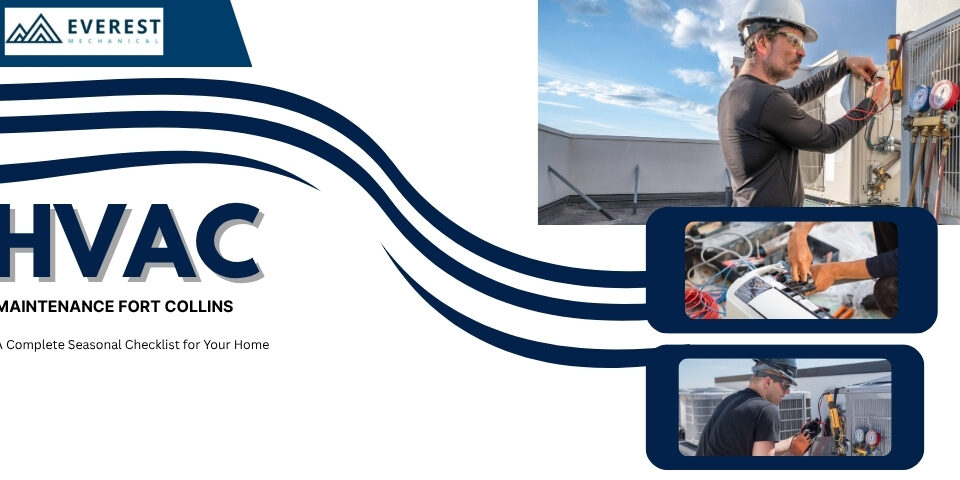- Servicing areas in and around: Estes Park, Longmont, Boulder, Arvada, Fort Collins, Denver, Loveland, and Lyons
- 8883880970
Improve Commercial HVAC System’s Efficiency with Building Automation
Emergency AC Repair Solutions with Same-Day Service by Everest Mechanical
March 20, 2024
How Smart HVAC Systems Boost Business Efficiency?
April 11, 2024Building automation has the potential to revolutionize how energy is consumed in commercial HVAC systems. With a proper building automation strategy, building owners can save significant energy and cost in the long run

Commercial buildings account for a significant portion of global energy consumption. In the United States alone, buildings are responsible for nearly 40% of total energy use, with HVAC systems being the largest energy consumers within those buildings, as reported by the US Energy Information Administration.
This constant energy drain leads to rising costs for building owners and operators, along with a growing environmental impact. Fortunately, advancements in technology offer a powerful solution: Building Automation. By integrating smart controls and real-time data analysis, building automation empowers businesses to significantly improve the efficiency of their commercial HVAC systems.
What leads to high energy drain in commercial HVAC systems?
Inefficient HVAC systems are a major culprit behind high energy bills in commercial buildings. Traditional systems often operate continuously, regardless of occupancy or actual needs. This constant operation, coupled with improper settings and a lack of responsive adjustments, leads to wasted energy and unnecessary costs.
According to a study by the American Society of Heating, Refrigerating and Air-Conditioning Engineers (ASHRAE), inefficient HVAC systems can contribute to energy waste of up to 30%. This inefficiency not only affects the financial status but also a larger environmental footprint, as buildings are a major contributor to greenhouse gas emissions.
What is Building Automation for Commercial HVAC Systems?
Building automation offers a comprehensive approach to managing commercial HVAC systems. It utilizes a network of sensors, controllers, and software platforms to collect real-time data on various factors like temperature, humidity, occupancy, and equipment performance. This data is then analyzed by the software to optimize system operation and ensure maximum efficiency.
Building automation empowers building managers with centralized control over their HVAC systems. They can remotely adjust settings, monitor energy usage, and identify potential problems – all through a user-friendly interface. This centralized control streamlines operations and eliminates the need for manual adjustments that can lead to inefficiencies.
Different Ways Building Automation Optimizes Energy Efficiency
Building automation can help in several ways to optimize commercial HVAC systems and achieve substantial energy savings.
Here are some key features:
- Smart Scheduling
Automation allows for automatic adjustments to temperature settings based on occupancy and time of day. For example, the system can lower temperatures during unoccupied hours and pre-condition spaces before occupants arrive, ensuring comfort without wasting energy. Studies by the Department of Energy suggest that smart scheduling alone can lead to energy savings of up to 30% for HVAC systems.
- Demand-Controlled Ventilation (DCV)
Traditional ventilation systems often operate at a constant rate, regardless of actual needs. DCV utilizes CO2 sensors to adjust ventilation based on occupancy levels. This ensures good indoor air quality while minimizing unnecessary energy consumption associated with excessive ventilation. According to a report by the International WELL Building Institute, DCV systems can potentially reduce HVAC energy usage by 30-60%.
- Real-Time Monitoring and Alerts
Building automation provides real-time data on system performance, including energy consumption, equipment status, and potential issues. This allows for proactive maintenance, preventing equipment failures and ensuring optimal system operation. Early detection of problems can lead to significant cost savings through timely repairs and extended equipment lifespan.
- Integration with Other Building Systems
Building automation systems can integrate with other building systems such as lighting, security, and window shades. This allows for further optimization and energy savings. For example, the system can automatically adjust lighting or blinds based on occupancy and daylight availability, reducing the reliance on artificial lighting and HVAC systems.
Additional Benefits to Enjoy
The benefits of building automation extend beyond just energy savings. These systems can significantly improve occupant comfort by maintaining consistent and desirable temperatures throughout the building. Additionally, they can enhance security by integrating with access control systems and provide valuable insights for streamlining facility management tasks.
Return on Investment (ROI)
Building automation offers a compelling ROI for businesses looking to reduce energy costs and improve operational efficiency. Studies by organizations like McKinsey & Company suggest that building automation systems can deliver energy savings of 15-30%. These savings translate directly to reduced operating expenses, leading to a payback period for the initial investment of typically 2-5 years. Additionally, improved equipment maintenance and extended lifespan further contribute to long-term cost savings.
Incentives and Rebates
Many government agencies and utility companies recognize the environmental and economic benefits of building automation and offer incentives to encourage businesses to adopt this technology. These incentives can take the form of tax credits, rebates on the purchase and installation of building automation systems, or low-interest financing options. Researching and taking advantage of such programs can significantly reduce the upfront cost of implementing building automation, making it an even more attractive proposition for businesses.
How to Implement Building Automation to Optimize HVAC Systems in Commercial Buildings?
The decision to implement building automation should be based on a careful consideration of factors like the type of HVAC system already in place, budget constraints, and the level of integration desired. Consulting with qualified professionals is important for designing and installing a system that meets the specific needs of the building. Building automation systems are available in various scales and complexities, catering to both large and small commercial buildings.
If you’re a building owner or operator interested in learning more about how building automation can benefit your business, consider contacting a qualified building automation professional like Everest Mechanical to discuss your specific needs and explore the available options. With the potential for significant energy savings, cost reductions, and environmental improvements, building automation is an investment that can pay off for years to come.
Everest Mechanical’s certified technicians are not only experienced in traditional HVAC installation and maintenance but also remain at the forefront of advancements like building automation. We can design and implement a customized building automation solution to optimize your system’s efficiency, reduce energy costs, and ensure year-round comfort for your occupants.
Contact Everest Mechanical today and breathe new life into your commercial building’s HVAC system.
Everest Mechanical is a professional commercial HVAC service company in Colorado having expertise in installing, maintaining, and repairing all kinds of furnaces, air-conditioning, and ventilation works.
We offer services in all areas of Colorado including:
- Denver
- Longmont
- Fort Collins
- Arvada
- Estes Park and
- Boulder
So if you are in search of a commercial HVAC service company, then just fill out the form and we will take care of the rest.



